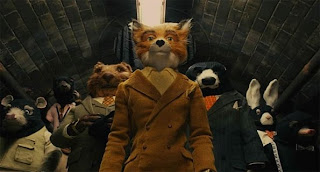
When I see movies, I simply shoot for story's that seem worth telling and one's that seem to be told well. I don't give much thought to the genre or target audience of the film. Thus, I was initially surprised to see several children in the theatre for this movie until I remembered the source material. By the time the end credits were rolling, I wanted to ask the kids in the theatre whether they enjoyed the movie or not. I couldn't help but wonder how I would have felt had I seen it when I was 7, 8, or 9. It would have had an odd effect on me, indeed.
This is not a traditional animated film, even if it does use one of the more traditional forms of animation. It is not always straightforward and direct nor does it even try to keep the senses fully satisfied during every second. In fact, the soundtrack can be very quiet at times with only simple, low dB foley effects added in to what would otherwise be silent stretches with no music to dictate the emotions with. I can imagine that I probably would not have enjoyed it as a child, because my taste was limited to what fulfilled my superficial expectations.
But kids should be taken to see this just so they can experience something different, yet in a familiar format. There is a lot that's expressed with these characters. Much of the narrative deals with finding one's identity. Mr. Fox asks:
"Why a fox? Why not a horse, a beetle, or a bald eagle?"
But nevertheless he is a fox, and in his attempt to live up to his desire of being "fantastic," he does what he does best and hatches up a master plan to steal from some rather mean farmers who in turn seek vengeance. This gets not only Mr. Fox, but the surrounding community running for their lives. Meanwhile, his son deals with insecurity after the arrival of his perfect cousin.
The script is witty, at times hilarious, and layered and Anderson makes nice use of the photography. His quirky direction is fitting to the main idea presented: we are all different, but "there is something fantastic about that." We have our abilities and inabilities and I suppose we can change how we feel about them. In the end, we just are who we are and do what we do and sometimes it might mean that no matter what we do to redeem ourselves, we are just another dead rat behind a Chinese restaurant.
















